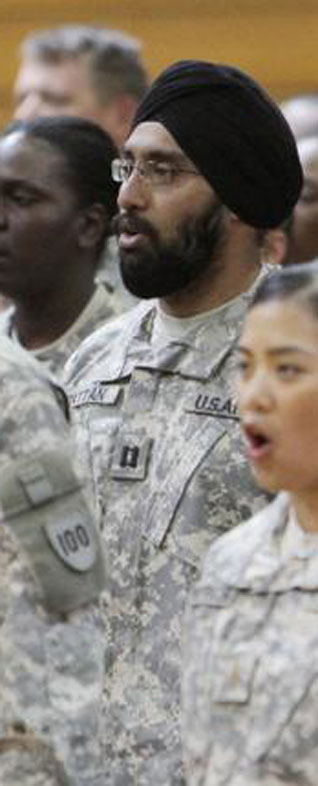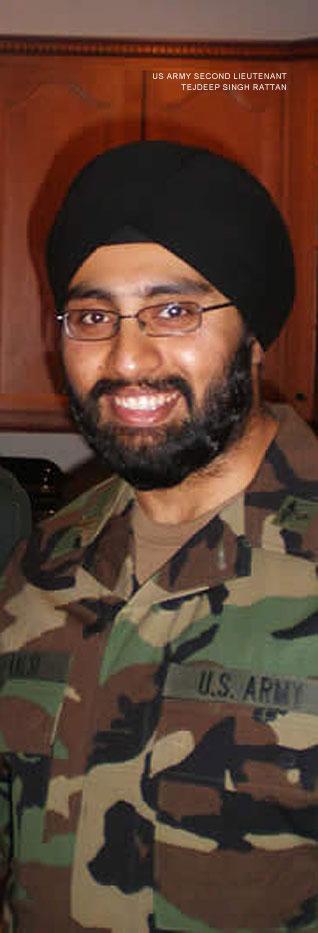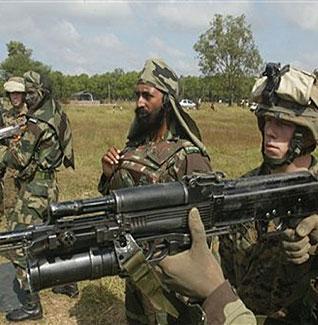Columnists
To Serve & Protect:
Sikh-Americans in US Army
by MEETA KAUR
General Frank Walter Messervy, a British Indian Army officer who served in World Wars I and II, described an observation he had of a particular kind of solider serving the British army:
"In the last two World Wars, 83,005 turban-wearing Sikh soldiers were killed and 109,045 were wounded. They all died or were wounded for the freedom of Britain and the World, enduring shell fire with no other protection but the turban..."
The sheer number of Sikhs soldiers cited serving in the British army is a testament to how much faith the British army has in Sikh soldiers. It is also a testament to the British Army's respect for turbaned Sikhs serving with their religious articles of faith intact.
The US Army has also recruited turbaned Sikh soldiers in the past, but has recently banned Captain Kamaljit Singh Kalsi, a New Jersey resident, and Second Lieutenant Tejdeep Singh Rattan, a New York City resident, from reporting for active duty on July 1st with their articles of faith intact.
Part of the military's objection to turbans and beards centers on esprit de corps, the common spirit existing in the members of a group and inspiring enthusiasm, devotion, and strong regard for the honour of the group.
The ban on a Sikh-American soldier's articles of faith suggests that the US Army regards the standard uniform of a crew cut and shaved face as the binding factor among US soldiers.
The explicit danger military soldiers can face indicates that most soldiers judge other soldiers by their character and their ability to perform in that life-defining moment, not their religious identity and appearance.
And if for a brief second we entertain the notion that soldiers are judged by their religious identity, wouldn't most soldiers want other soldiers of committed faith by their side?
During World War I, American women and African Americans struggled to fully participate in the US Military for fifty years, because gender and race were perceived as a disruption to military unit cohesion.
In 1948, President Harry Truman punctuated this struggle with executive orders that granted full US Military participation to both American women and African Americans on the basis of equality.
Today, both parties occupy US military leadership roles and participate in combat.
This again reinforces that there is something deeper than appearance in the way of race or gender that binds US military soldiers together to create a common spirit. When it comes down to life-defining moments, most converge on the shared experience we call life.
As a nation, we have outgrown these outdated inequalities, so let's move forward and not waste time re-living archaic notions that suggest we ban Sikh-Americans from the US Military, only to let them participate fifty years from now. Let's get on with the business at hand.
A Sikh-American's turban is an article of faith that binds a Sikh to an ethical code of conduct. Part of that conduct includes protecting and serving fellow human beings.
Banning a Sikh soldier's articles of faith will destroy the very spirit that will promote and contribute to the common enthusiasm, devotion and strong honor for the group within a military unit.
A Sikh soldier's turban is a guarantee of that very spirit.
Let Sikh-Americans serve in the military with their articles of faith.
[Courtesy: nj.com]
June 27, 2009
Conversation about this article
1: I.J. Singh (New York, U.S.A.), June 27, 2009, 10:13 AM.
It took women over 150 years to get the right to vote; Black and White units in the United States armed services were not integrated until Harry Truman finally moved on the issue during the Second World War. We have been here a hundred years but, considering that we won the right to vote only in 1946, we remain the new kids on the block. Progress is slow and history is continually made, but never smoothly and always in a non-linear path. Certainly, in the matter of the armed services, we will need passion but, even more importantly, the steady, consistent unwavering commitment and dedication of a lifetime. Notwithstanding the zigzags, the steady march of this society is heartening. Success will be ours. As a song from the protest marches for racial equality in the 1960s goes: "I do believe deep in my heart that we shall overcome someday."






